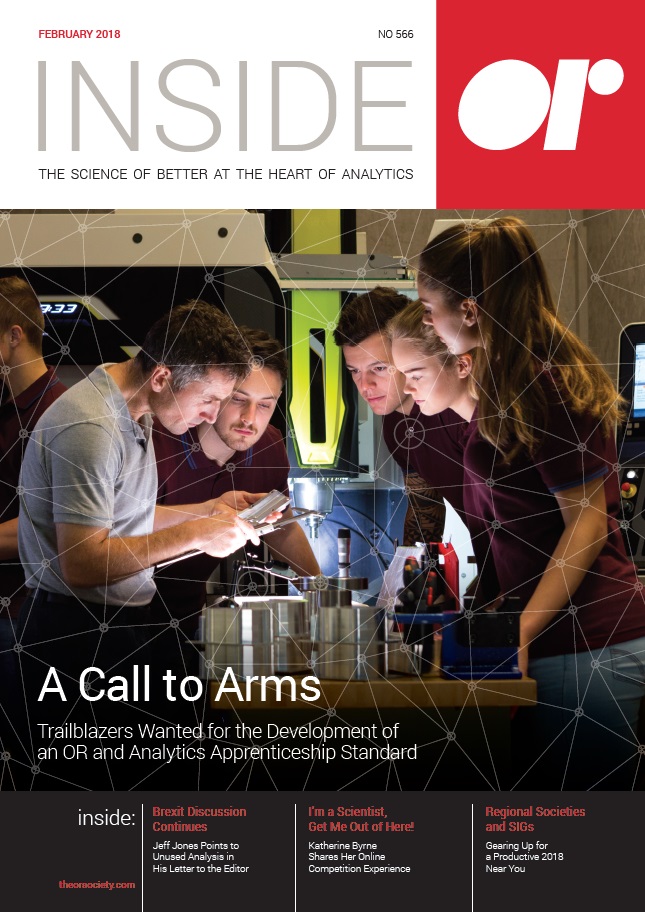This month, ERC Chair Alistair Clark calls on OR employers to develop a Level 7 Apprenticeship Standard in Operational Research and Analytics; entries are being received for several of the Society's prestigious awards; ORS Member Katherine Byrne competes in I'm A Scientist, Get Me Out of Here; and the organisers of SW18 and OR60 tell us what's in the works for attendees at each event.
A Call to Arms
ALISTAIR CLARK, FORS, CHAIR OF THE OR SOCIETY’S EDUCATION AND RESEARCH COMMITTEE
The Education and Research Committee (ERC) oversees a lot of what most members would see as one of the key set of activities of the Society. I’ve just taken over as Chair of the ERC from Martin Kunc to whom great thanks are due for leading the committee these past three years.
ERC has potentially many responsibilities within its remit, possibly too many to be effective in all of them. So I’d like to acknowledge the role and contribution of the Research Panel in focusing on the ‘R’ in ERC. The panel, set up and chaired by Kevin Glazebrook and now supported by Charlene Timewell, our Research & Publications Officer in the OR Society office, has taken a lead that ERC would have struggled with on its own. It helps ensure that operational research (OR) has an organised voice in the wider research community, particularly within the research councils and the REF, and provides valuable information and advice to OR academics, especially ECRs (Early Career Researchers).
This means that ERC, while being the reporting link between the Research Panel and the society’s General Council and Board, has been concentrating on the ‘E’ in ERC. In particular, we are taking forward two key projects.
The first is to boost the OR in Schools (ORiS) project, chaired by Vicki Chase and supported by Sophie Parker, our Education Officer in the OR Society office. I recently attended one of Sophie’s training sessions for ORiS volunteers in my own city of Bristol. It was great fun to try out some of the extensive materials that ORiS provides for volunteers to use in the classroom. I was also intrigued to see that most of the other participants were not from OR, but from other areas of mathematics and science. They were volunteering to promote maths in schools via OR, supported by a wealth of learning materials developed by the Society over the years. Yet there are numerous ORiS requests to visit schools or careers fairs that the society cannot fulfil due to a lack of volunteers able to attend and help out. Sophie gets many requests from all over the UK: some are for only an hour, some for a day, others in between, so there’s choice for everyone. If you are able to visit, even justonce, that would be great. There is no need to prepare material in advance as it is all provided. Just get in there and enjoy the visit. So please do contact Sophie, [email protected], as your help is needed and appreciated.
The second project is the development of a Level 7 Apprenticeship Standard in OR and Analytics. In 2016, ERC decided to map the origin of OR workers in the UK. The relative numbers have shifted significantly in the last 10-20 years. While OR Master’s graduates used to account for 75% or more of new UK entrants into OR, they now account for less than 10%, with a corresponding rise in the proportion of first degree new entrants (from about 20% up to 75%). Recruiting OR workers via universities is getting more expensive for employers, given the multiple channels, the greater number of courses and universities that provide OR workers, and the increased need for more rounding and up-skilling of new OR recruits after they join an organisation. Thus apprenticeships are emerging as employers look to recruit OR and other analytical workers through routes other than traditional university degrees, and with practical and financial assistance provided through government aided apprentice schemes.
At their joint meeting in November, both HORAF (Heads of OR and Analytics Forum) and COPIOR (Committee of Professors in OR) gave their support to the development of a Level 7 Apprenticeship Standard in Operational Research and Analytics. This would enable OR and analytics employers to use the government’s new apprenticeship levy to provide their employees with MSc-level education and training on OR and analytics. ERC can guide and advise the development of an apprenticeship standard but the actual development must be undertaken by a trailblazer group of at least 10 employers.
The trailblazer group needs to:
- Include a wide range of employers committed to working actively on the standard’s development and intend to use it once it has been approved for delivery.
- Reflect the range of companies which employ people in OR and analytics, including size,geographical spread and sector.
- Have at least two employers with fewer than 50 employees.
The OR Society can support the group with resources, but cannot lead the development and approval of a standard. This must come from a trailblazer group of employers. So this is also a
call-to-arms to practitioner/employer members of the OR Society to join the trailblazer group.
To do so, please email Alan Robinson, the co-Chair of HORAF, at APRobinson [at] mail.dstl.gov.uk and Alistair Clark, the Chair of ERC, at Alistair.Clark [at] uwe.ac.uk



